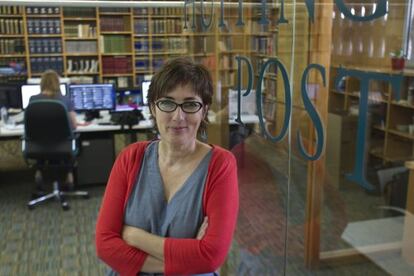El Huffington Post is born
A Spanish version of the world-famous website comes online Politicians and filmmakers from Spain will be among its many bloggers


In May 2005, Arianna Huffington launched a new kind of website, where blogs and reader contributions constituted the core content. The Huffington Post went on to generate public debate, it overtook The New York Times site in terms of visitor traffic, and it saw its reputation cemented when it won a Pulitzer Prize for national reporting, for its military correspondent David Wood. The “internet newspaper,” as it calls itself, went on to launch editions in Canada, France and the UK. And now, the HuffPo is coming to Spain.
Just after midnight on Wednesday the Spanish version of The Huffington Post went out live under the leadership of Montserrat Domínguez, a well-respected journalist whose face is familiar to Spain's TV viewers for her work on the Antena 3, Telecinco and Canal+ private networks. The newsroom is housed in the same building as EL PAÍS, whose parent company, PRISA, owns 50 percent of El Huffington Post, as the Spanish site has been baptized.
The latest figures released by Comscore, a digital statistics company, show that HuffPo is leading global online newspaper sites, with over 48 million unique users.
The website is built on three foundations: a column for bloggers, another one for hard news, and a third for “soft” news. This formula brings together hard-hitting issues and celebrity reporting, as well as fun content that gets a huge internet following.
Bloggers for El Huffington Post will include filmmakers Alex de la Iglesia and Santiago Segura
“It touches on all the issues that you would discuss at a cocktail party,” explains David Flumenbaum, who was sent over to Madrid from the New York headquarters to help with the Spanish launch. “You would talk about the presidential elections, but also about sports or the latest celebrity gossip.”
With this formula in mind, Domínguez knows what her priorities are: “We need to talk about politics and economics, now more than ever. Having said that, while I want to know what happened with the European Central Bank and Syria, I also want to know if Madonna is going to sing in Basque when she comes to Madrid. There is a time and a place for everything.”
Arianna Stassinopoulos, born in Athens in 1950, is the former wife of oil tycoon Michael Huffington, as well as once having run for governor of California. She founded The Huffington Post together with Ken Lerer in May 2005, and knew that she needed famous names on her list of contributors. So she pulled out her legendary book of contacts and soon convinced the likes of Barack Obama, Norman Mailer, Nora Ephron and Alec Baldwin to get involved.
The site launched with 500 bloggers, and two years later had 30 journalists on the payroll. These days, it counts on 200 journalists and more than 9,000 bloggers, and has versions in five countries (including Spain), with an Italian version on its way.
Besides the seven journalists who will work out of the EL PAÍS newsroom, bloggers for El Huffington Post will include filmmakers Alex de la Iglesia and Santiago Segura, and politicians such as Justice Minister Alberto Ruiz-Gallardón and Basque regional premier Patxi López.
El Huffington Post caused controversy when it emerged that it will not be paying its bloggers. But Domínguez says that “for a lot of people, publishing on a medium like this one is a valuable opportunity to reach more people. Before, only a few of us used to write, but now anyone who wants to communicate, tell stories or share experiences can. There are a lot of people who write about things they are passionate about. And many do it really well.”
Tu suscripción se está usando en otro dispositivo
¿Quieres añadir otro usuario a tu suscripción?
Si continúas leyendo en este dispositivo, no se podrá leer en el otro.
FlechaTu suscripción se está usando en otro dispositivo y solo puedes acceder a EL PAÍS desde un dispositivo a la vez.
Si quieres compartir tu cuenta, cambia tu suscripción a la modalidad Premium, así podrás añadir otro usuario. Cada uno accederá con su propia cuenta de email, lo que os permitirá personalizar vuestra experiencia en EL PAÍS.
En el caso de no saber quién está usando tu cuenta, te recomendamos cambiar tu contraseña aquí.
Si decides continuar compartiendo tu cuenta, este mensaje se mostrará en tu dispositivo y en el de la otra persona que está usando tu cuenta de forma indefinida, afectando a tu experiencia de lectura. Puedes consultar aquí los términos y condiciones de la suscripción digital.







































